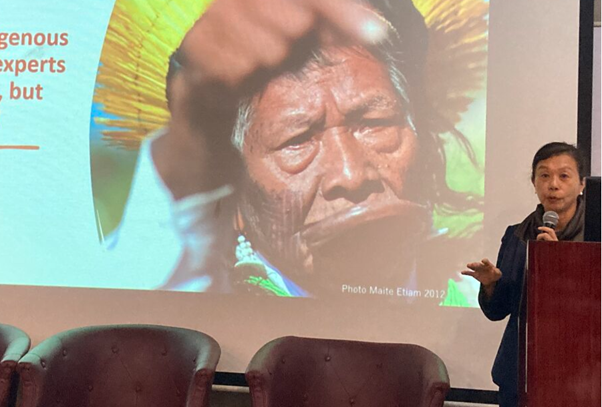Working With Indigenous Peoples for the Co-creation of Solutions to Sustainability Challenges: The Global Development Network Annual Conference
2023.12.28
Executive Director Mine Yoichi and Research Fellow Noguchi Fumiko, both of the JICA Ogata Sadako Research Institute for Peace and Development, took part in a discussion about collaboration between development practitioners and indigenous people on sustainability issues at the annual conference of the Global Development Network, Oct. 31-Nov. 1, 2023, in Ecuador.
On the second day, the JICA Ogata Sadako Research Institute organised the parallel session “Working with Indigenous and Local Community People for Co-creation of Solutions to Sustainability Challenges”, where Mine served as the moderator and Noguchi as a presenter and panellist.

Mine Yoichi, executive director of the JICA Ogata Research Institute, served as moderator of the session “Working with Indigenous and Local Community People for the Co-creation of Solutions to Sustainability Challenges.”
Mine began the event by sharing a story about the environmental pollution in Japan (Minamata disease) in the 1950s and 60s and the mercury poisoning in the Amazon basin due to small-scale gold mining operations in the 1990s. He explained that this context gave rise to a JICA technical cooperation project between Japan and Brazil, allowing Japanese scientists to provide methods for the precise measurement of mercury contamination and also to advance trust between the people of the two countries.
In her presentation, “Integration of Indigenous and Local Knowledge to Community Development: Hopes and Challenges,” Noguchi underscored the increasing impact of climate-induced natural disasters on biodiversity and human health, giving the example of the catastrophic Australian bushfires of 2019-2020.

Noguchi Fumiko, research fellow at the JICA Ogata Research Institute, highlighted the need for indigenous and local knowledge integration for sustainability challenges.
Noguchi gave credit to indigenous communities from Ecuador, the Ainu people of Japan, and the Aboriginal peoples of Australia, saying her collaborations with them informed her insights. The increasing frequency and intensity of natural disasters not only inflicts irreversible environmental damage but also worsens the socioeconomic, educational, political and cultural disparities in local communities, she said. This affects human migration, complicating the makeup of local communities and posing new challenges for their development and sustainability.
Sustainability challenges like climate change are considered “wicked problems,” Noguchi said, and conventional scientific methods are not always sufficient. While offering solutions to specific aspects of problems, they can have the unintended consequences of creating new issues or aggravating existing ones. An inclusive process is needed to come up with locally adaptive solutions, ones that genuinely integrate indigenous and local knowledge systems into the community development process through ensuring the active participation of its knowledge holders, she added.
Noguchi named five epistemological challenges and one political challenge in their participation. She explained that differences in knowledge of the stakeholders, in particular between the experts with modern scientific knowledge and the ones with indigenous and local knowledge. While scientific knowledge is explanatory, explicit and universal, indigenous and local knowledge is generally observatory, tacit and locally contextual. Such contrasts in nature can allow the former to be overpowering while the latter is overlooked or even dismissed. Power dynamics, too, play a role, where traditional, local, and indigenous knowledge is underestimated as outdated or less relevant compared to modern scientific knowledge. Language and place further complicate the dialogue amongst the stakeholders. The dominant language, often the one used in discussions by the experts, creates an environment where the discussion flow and content are drawn towards the experts' views and understanding. The place where normally the discussion is conducted, such as a meeting room in a building, can disconnect the local/indigenous knowledge holders from where they belong –connection to their society and environment such as land and sea.
Finally, she touched on the relevance of indigenous and local knowledge to the current, unprecedented environmental challenges, suggesting that even this knowledge might need updating or re-evaluation in the face of new types of natural disasters.
To overcome these challenges, Noguchi proposed a six-step process aimed at fostering fair and equal collaboration between experts and indigenous/local communities. This includes setting aside past learning; mutually stepping into each other's contexts; unlearning and relearning; finding a common language; discussing, testing and making errors together; and co-deciding on relevant knowledge. She stressed the importance of coordinator figures who can navigate across different knowledge systems and facilitate this process.
Noguchi’s presentation was followed by those of the two other speakers, Victor Steffensen, co-founder of Firesticks Alliance, Australia, and Tsyon Asfaw, an Ethiopian Ph.D. student at the University of Antwerp in the Netherlands. Steffensen spoke about the need for traditional and indigenous knowledge for healthy landscapes, which could bring about a healthy community, economic opportunities and environmental sustainability. Asfaw discussed the importance of engaging indigenous people in all stages of conservation practices to restore the declining numbers of large carnivores in Ethiopia.
Mine wrapped up the event with a message about the Sustainable Development Goals (SDGs) and their linkage with indigenous knowledge. While the performance of the SDGs is often discussed in the country framework, the national averages can obscure local nuances, he said. The national performance will improve only when we successfully strengthen local community engagement with the SDGs. And for this, local/indigenous knowledge must be leveraged as a central theme and integrated into the mainstream development discourse, he said.

事業事前評価表(地球規模課題対応国際科学技術協力(SATREPS)).国際協力機構 地球環境部 . 防災第一チーム. 1.案件名.国 名: フィリピン共和国.

事業事前評価表(地球規模課題対応国際科学技術協力(SATREPS)).国際協力機構 地球環境部 . 防災第一チーム. 1.案件名.国 名: フィリピン共和国.

事業事前評価表(地球規模課題対応国際科学技術協力(SATREPS)).国際協力機構 地球環境部 . 防災第一チーム. 1.案件名.国 名: フィリピン共和国.

事業事前評価表(地球規模課題対応国際科学技術協力(SATREPS)).国際協力機構 地球環境部 . 防災第一チーム. 1.案件名.国 名: フィリピン共和国.

事業事前評価表(地球規模課題対応国際科学技術協力(SATREPS)).国際協力機構 地球環境部 . 防災第一チーム. 1.案件名.国 名: フィリピン共和国.
scroll